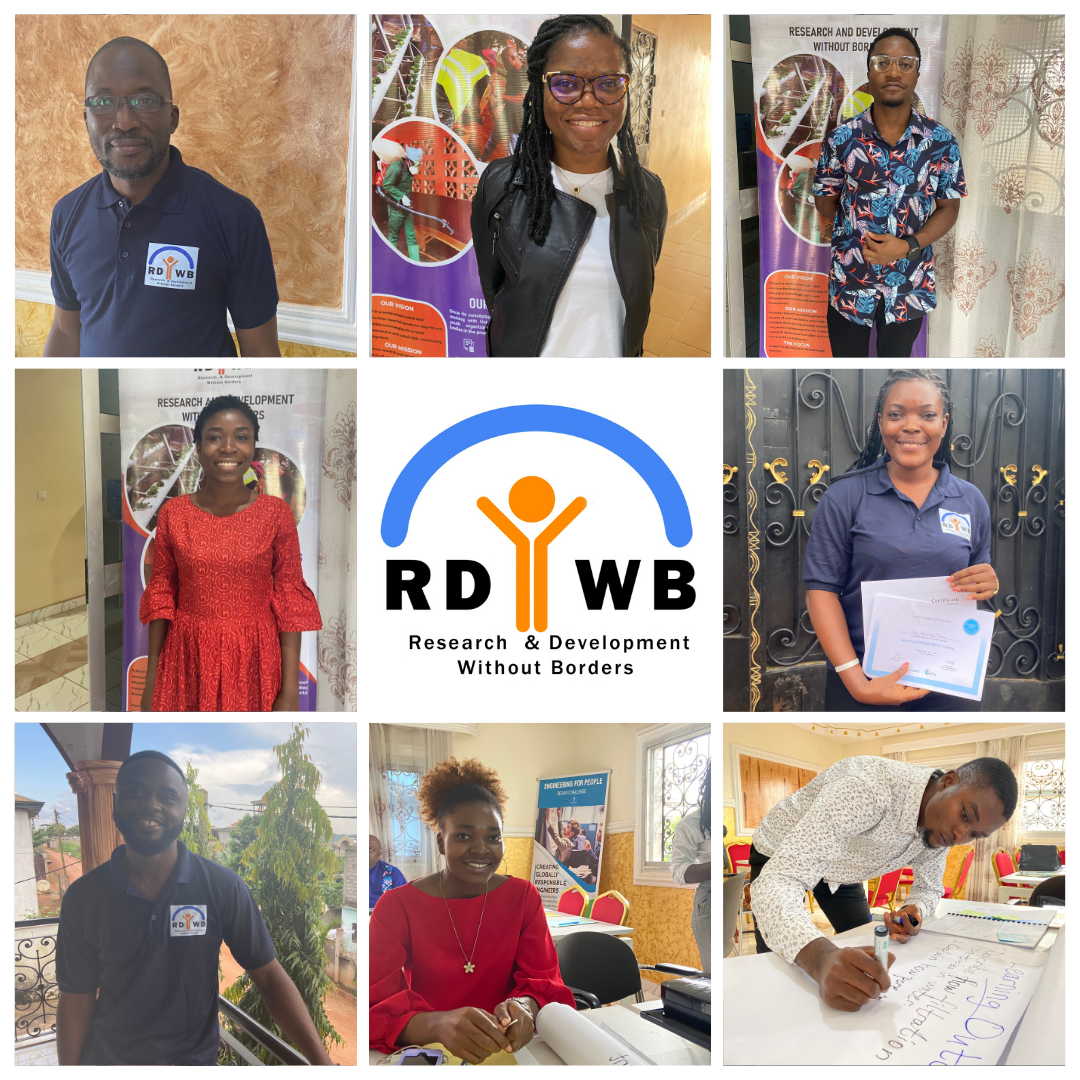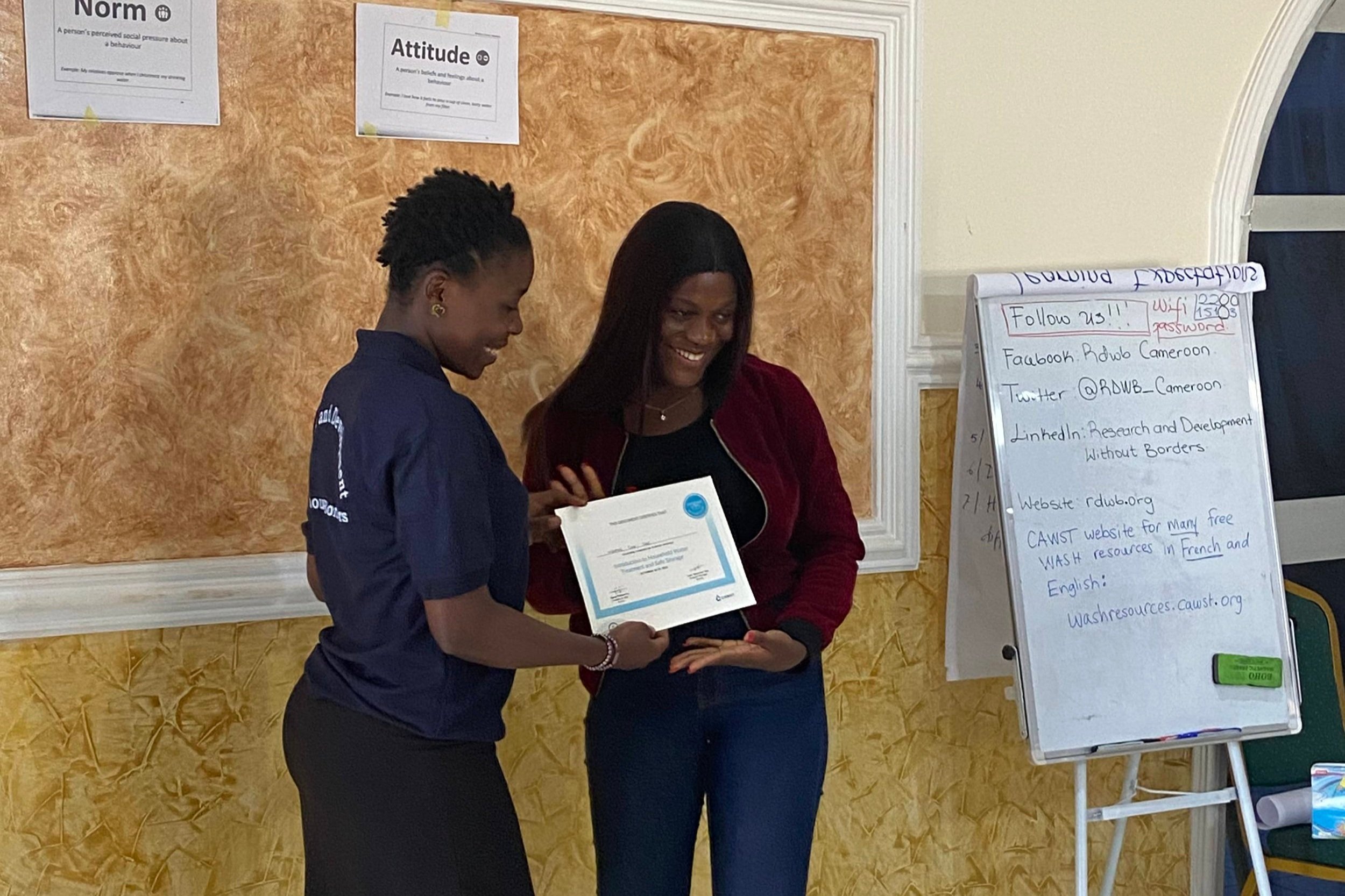Partnering for Impact in Cameroon
In the central African country of Cameroon, 8 million people lack access to clean drinking water, and many more face water, sanitation and hygiene (WASH) challenges every day. People living in low-income suburban and rural areas are the most vulnerable.
Research and Development Without Borders (RDWB) has been working with communities across Cameroon since 2020 to ensure equitable, sustainable and affordable access to water and sanitation services. With support from CAWST, they specialize in bridging the gap between research and practice, engaging communities for lasting solutions that improve the lives of families.
Founder and CEO Ngang Christian leads a passionate team of professionals from diverse academic, professional and entrepreneurial backgrounds. To date, they have provided training to about 100 people in Cameroon.
The team at Research and Development without Borders. Clockwise from top L: Ngang Christian, Nfongoh Thiophine F., Ngeh Roberto Ayuni, Ichu Blessing Mbong, Chengwa Precious, Che Hilda Mbenyui, Maxime Nsufor Abongwa and Eboudé Assoué Akwélé.
A promising start
The relationship between RWDB and CAWST began in 2021. After co-facilitating an online workshop in 2022, global WASH advisors Taya Raine and Olivier Denis traveled to Cameroon in April 2023 to help them facilitate an in-person workshop in Bekoko. Together they led participants from 9 local organizations through an introduction to household water treatment and safe storage (HWTS). The team at RDWB committed to practicing what they had learned, proposing that they deliver the same workshop to another cohort the following week.
Members of the RDWB team sit down with CAWST advisor Olivier Denis to discuss their workshop facilitation. Pictured from L-R: Olivier Denis, Ichu Blessing Mbong, Ngang Christian, Semi Yam, Maxime Nsufor Abongwa, Nfongoh Thiophine F.
This avid approach continued through much of 2023, as the team delivered a series of 10 practice workshops – to church missions, development organizations, private sector companies, and others. With every iteration, they made refinements and strengthened their subject matter expertise, using CAWST’s trainer competency framework to support their development. They made rapid adjustments to suit the needs of learners, translating the curriculum for French-speaking participants, even delivering entire workshops in local Pidgin.
A strong finish
In October 2023, CAWST advisors returned to Cameroon to observe the team of trainers as they delivered the Intro the HWTS workshop at their headquarters in Yaoundé, to a cohort of about a dozen participants. What they saw was astonishing.
The team presented lessons on household water treatment with enthusiasm and clarity. They showed advanced presentation and facilitation skills, transferring technical knowledge with comprehensive demonstrations and lectures. They moderated lively discussions and fielded volleys of questions from the engaged group of learners. They supported each other using a nonverbal shorthand that only comes from months of preparation and practice together. They seamlessly adapted their delivery to daily challenges like power outages, late meals, and the clatter of rainstorms. Despite the weight of the subject matter, participants commented that the team made the learning environment dynamic, interactive and fun.
Ngwana Tina Tebe completed the HWTS workshop hosted by RDWB in October 2023 (pictured at right, receiving her certificate from Eboudé Assoué Akwélé). She is an environmental engineering student in Yaoundé, who came to the workshop to learn more about making HWTS accessible to a broader audience. She enjoyed the dynamic nature of the workshop, and commented that the lessons on behavior change would be particularly valuable to her going forward.
And even more importantly, it made a noticeable difference in the lives of community members. Facilitators described to advisors the impact of their training that they had seen.
“People will come and tell me they are facing water problems in their community. They say they didn’t know the best solution before. But with this training, they know what to do. It’s the answer that tells us we are doing something good in our community and we should not stop. We should keep pushing to other communities because creating awareness and giving knowledge helps us all have a healthy life.”
- Obi Eban Ruth, Project Assistant, Research and Development Without Borders
After the close of the workshop, 13 learners received certificates of completion, and CAWST recognized the RDWB team with certificates of validation. As a result of their hard work and dedication, they are now authorized to deliver Introduction to HWTS workshops independently, serving organizations and agencies in Cameroon that implement WASH projects with expert-level training. But our support for RDWB doesn’t end there!
The journey continues
What’s next for our training partners in Cameroon? The team at RDWB has already participated actively in additional capacity development supplied by CAWST global WASH advisors. Within weeks of earning their validation, they also earned certificates in Delivering Effective WASH Trainings (DEWT) and Drinking Water Quality Testing (DWQT). With more practice and co-facilitation on these topics, they are poised to deliver them independently in addition to HWTS, expand their service delivery into community WASH promotion, and go beyond the borders of Cameroon.
“The central region of Africa is still limited. In Cameroon, we have a bilingual society and we’re bringing in more French-speaking people that can facilitate training. One of our objectives is to reach out to those other countries that are purely French-speaking and to bring the same knowledge to them. So in the next 10-30 years, I think we will be able to reach out in a region-wide kind of approach and be able to impact more communities in Africa.”
- Ngang Christian, Founder and CEO, Research and Development Without Borders
RDWB aims to provide training to 1,000 people in and around the country by 2030. CAWST will continue to support them with technical advice and consultation, as well as with tools, templates and strategies to build awareness of WASH, grow their audience and cultivate deeper relationships with their clients.
As we look ahead, our shared vision is to live in a world where everyone has full access to easy-to-use, affordable technologies for safe water and sanitation. Our work has just begun as millions across Cameroon are still vulnerable to waterborne diseases. This is where support from North America and other international partners becomes pivotal.
Give now to support our mission.
With your help, we can empower communities, transform lives, and ensure everyone in Cameroon has access to clean and safe drinking water.
Learn more:
CAWST provides support services and resources to over 500 organizations — government agencies, community groups, and local and international nongovernmental organizations (NGOs) of all sizes — in many countries. Read about our impact in tackling the worldwide water and sanitation challenge.
Discover Household Water Treatment and Safe Storage (HWTS). Browse products and technologies, learn about implementation approaches, and discover projects, regulations and policies across countries.




